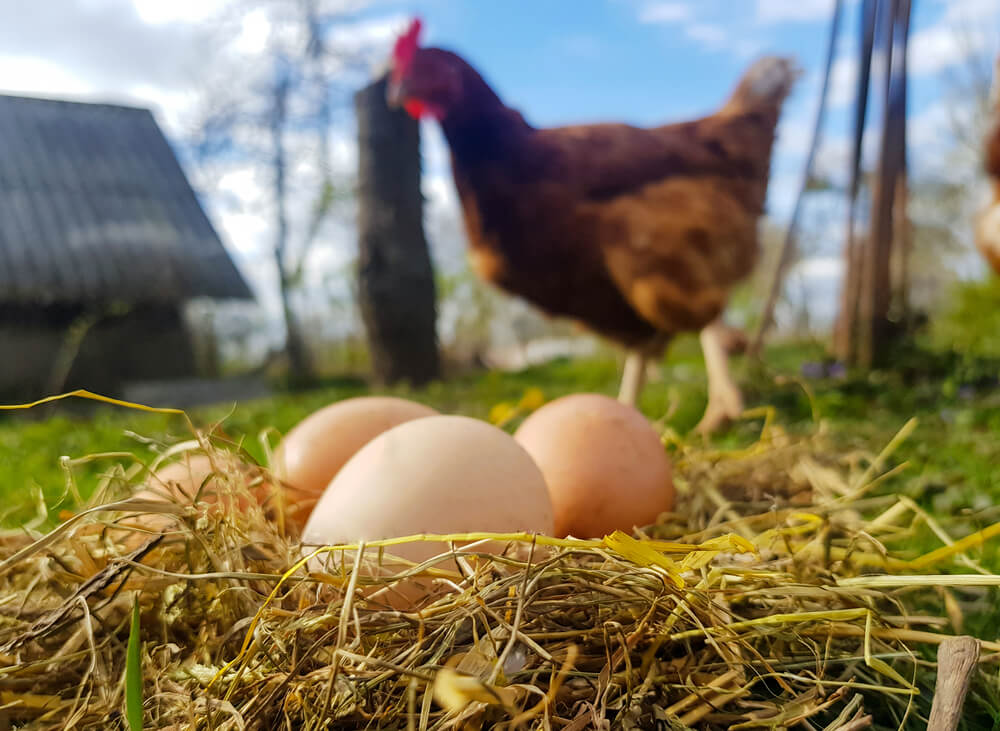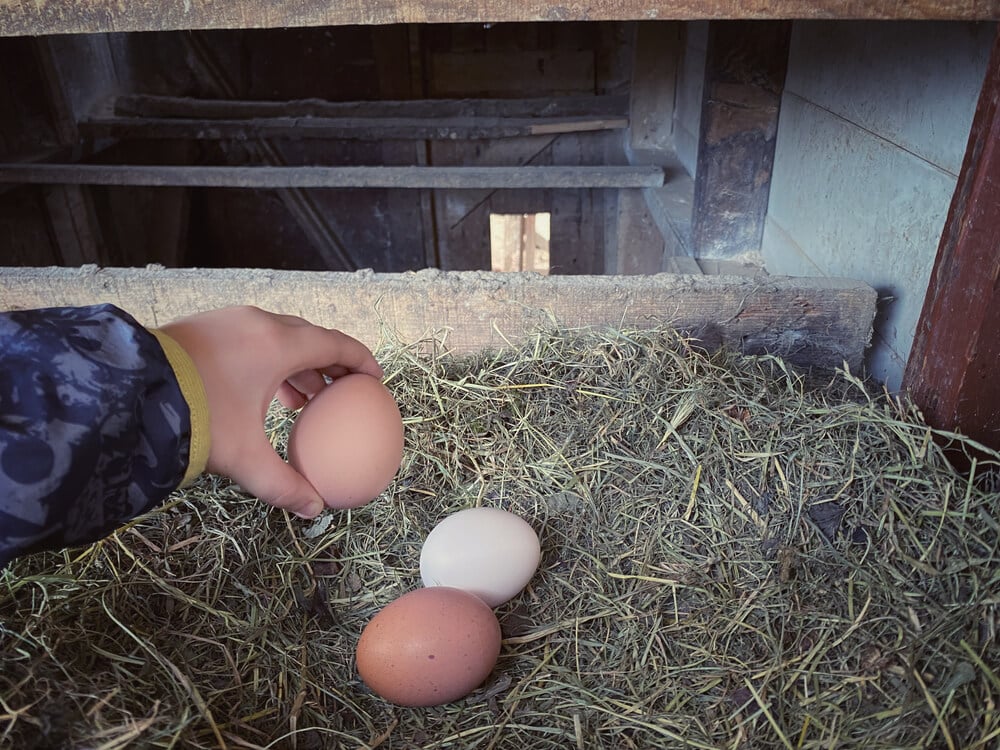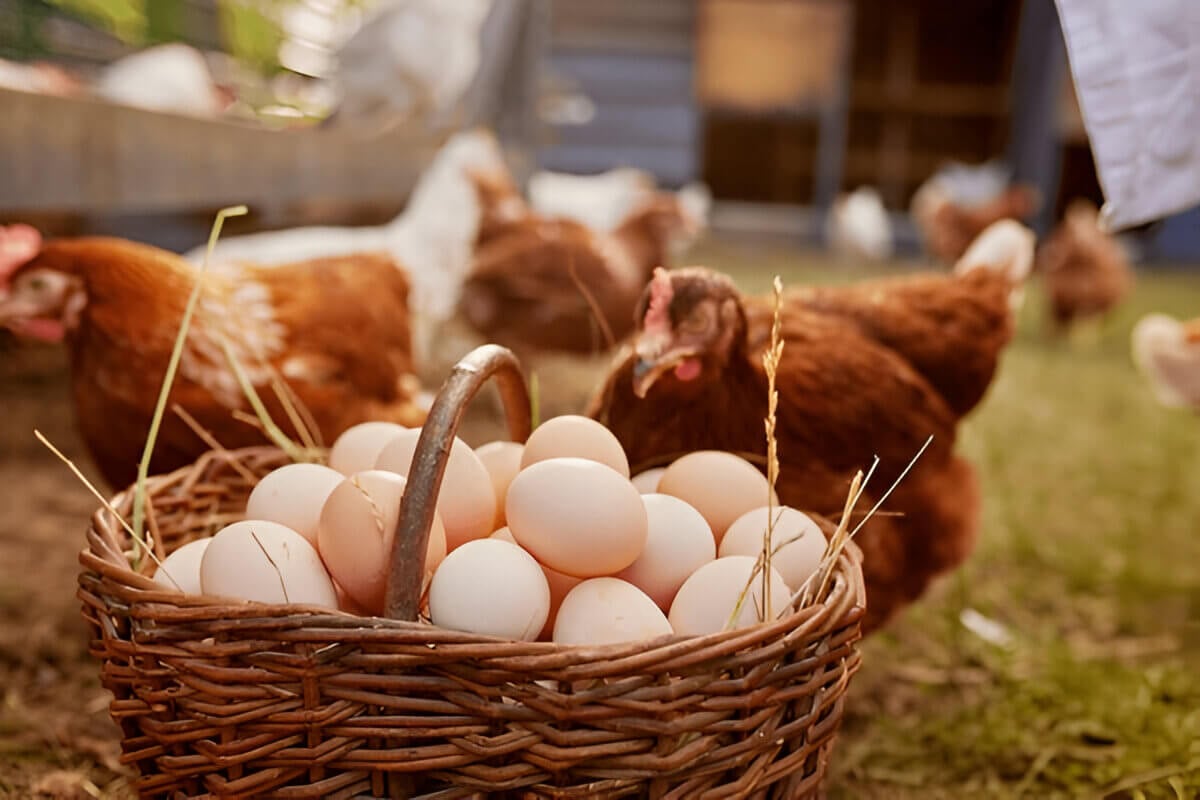Table of Contents
How to Wash Farm Fresh Eggs (And Keep Them Safe)
To wash your farm fresh eggs use lukewarm water preferably between 90 and 110 degrees and if the eggs are fairly clean a quick rinse will do. If eggs are very dirty or soiled you can use a bit of dish soap and and egg brush to gently wash them. Make sure to pat your eggs dry right away.
Danny here with the Chicken Coop Company and there are many considerations when deciding whether to wash farm fresh eggs or not so I'll guide you through them in the rest of this article.
Cracking open a farm fresh egg—golden yolk shining—is the best part of backyard chicken keeping. Collecting these little gems from your own hens is not only a fun routine; it’s also a direct ticket to better tasting, healthier and more sustainable breakfasts. But with fresh eggs comes a task that many chicken keepers wonder about—washing and storing them. Done right and your eggs will be clean, safe and ready to eat.
If you want to learn how to wash your freshly gathered eggs without compromising their quality you’re in the right place. This post will explain why you may need to wash eggs, walk you through the wash-or-not-wash debate and give you a step by step guide to washing and storing your farm fresh eggs.
Understanding Farm Fresh Eggs
Farm fresh eggs are a delightful treat for anyone lucky enough to have backyard chickens or access to a local farm. These eggs are often considered superior in taste and quality compared to their store-bought counterparts. Why? Because farm fresh eggs come from hens that are typically raised in more natural conditions, such as pasture or free-range environments or best of all your backyard.
These hens have the freedom to forage, exercise, and enjoy a varied diet, which results in eggs that are richer in nutrients and boast a more vibrant yolk color. Hopefully you're feeding your chickens table scraps and if you have questions on what can chickens eat and not eat I'll link our guide here. Understanding these characteristics helps in appreciating the value of farm fresh eggs and ensures proper handling and storage to maintain their exceptional quality.
Why Clean Eggs Matter? Health and Safety First
When it comes to fresh eggs, cleanliness isn’t just about looks—it’s about safety too. Eggs pass through the same reproductive passageway as chicken poop so bacteria like salmonella can sometimes get on the surface of the egg. While an intact eggshell is a natural barrier, dirt, mud or manure stuck to it is a health risk for anyone handling or consuming the eggs. We've found that using nesting pads in your chicken coop can help keep eggs cleaner, reduce the risk of damage and it makes cleaning out nesting boxes easier.
For backyard chicken owners selling eggs to friends, family or at local farmers markets, making sure your product is clean and safe is vital—not just for looks but for peace of mind. To ensure this, it is important to clean farm fresh eggs using proper techniques like the wet-wash method, which involves using water and tools such as an emery cloth or brush, and refrigerating the eggs immediately after washing.
Did You Know About the Bloom?
Before we get into the egg-washing debate, let’s talk about egg shells and the bloom. Also called the cuticle, this invisible layer is applied to the egg as it’s laid and seals the microscopic pores in the shell, which is primarily made of calcium carbonate, and prevents bacteria from getting in. The bloom is nature’s perfect preservation system but it’s also fragile—washing an egg removes this protective layer.
The Great Egg Washing Debate
Ah, the question that divides backyard chicken keepers worldwide—do you wash your eggs or leave them as is? The answer often depends on where you live and how soon you’ll be eating your eggs.
Reasons Not to Wash Eggs
Storage Life: Unwashed eggs with their bloom intact can sit on your counter for weeks without refrigeration (yes, weeks!). Many European countries don’t wash eggs for this reason.
In the United States, commercial eggs are mandated to be washed and refrigerated, whereas many other countries ban the washing of commercial eggs altogether. This washing process removes the protective bloom, potentially increasing bacterial exposure, including Salmonella.
Bloom Protection: By leaving the bloom intact you reduce the risk of bacteria getting into the egg through the porous shell.
Minimal Handling: Dirty eggs handled or washed improperly can increase contamination.
Reasons To Wash Eggs
Visible Dirt: If your chickens treat the nesting box like a mud wrestling pit, you may need to wash the eggs laid.
Best Practice for Selling Eggs: If you’re running a home-based egg selling operation, clean eggs are more marketable and presentable to buyers.
Local Guidelines: Some states or health departments require eggs to be washed and refrigerated, especially for commercial purposes.
In the end, the decision to wash or not is up to your eggs’ cleanliness and how you will store and use them. If you do need to wash, be gentle to avoid compromising the egg or its safety.
When to Wash Fresh Eggs
The question of whether to wash fresh eggs is a hot topic among farmers and consumers alike. On one hand, washing eggs can remove visible dirt and bacteria, making them look more appealing. On the other hand, washing can strip away the egg’s natural protective coating, known as the bloom, which helps keep bacteria out. The decision to wash fresh eggs often depends on their cleanliness, how you plan to store them, and personal preference. Generally, it’s best to wash eggs just before you use them. This way, you can enjoy the benefits of the bloom for as long as possible, reducing the risk of bacterial contamination.
How to Wash Farm Fresh Eggs
Washing fresh chicken eggs is not complicated but you need to use the right method to avoid damaging the shell or encouraging bacteria growth. Follow these steps:
Step 1. Inspect and Sort
First inspect all the eggs you’ve gathered. Slightly dirty eggs may just need a dry buffing with a clean cloth or sponge to knock off debris. Heavily soiled eggs will need a wet cleaning.
Use water that’s warmer than the egg’s internal temperature. Cold water can cause the egg’s contents to contract and pull bacteria through the pores of the shell. Think lukewarm, around 90°F–110°F. Don’t use hot water as it can damage the shell and cook the outer membrane slightly.
Step 2. Wash Gently
For lightly dirty eggs a quick rinse under running warm water will do. For heavily soiled eggs gently scrub with a designated egg brush or a soft cloth. Add a drop of mild dish soap if needed but avoid harsh detergents that can break down the shell. Work one egg at a time to minimize bacteria spread.
Step 3. Dry Immediately
Pat each egg dry with a clean towel to remove any excess moisture. Moisture sitting on the shell can lead to bacteria growth so make sure the eggs are dry before storage.
Danny's Pro Tip: Wash eggs just before use if possible. Washing removes the bloom so only clean what you’ll use or refrigerate right away.
Common Mistakes to Avoid
Handling and storing fresh eggs might seem straightforward, but there are a few common pitfalls to watch out for. One major mistake is washing eggs in cold water, which can create a vacuum effect that pulls bacteria into the egg through the pores in the shell. Another error is using soap or bleach to clean eggs, as these substances can damage the egg’s natural protective coating. Additionally, storing eggs in direct sunlight or at high temperatures can cause them to spoil quickly. To keep your eggs safe and fresh, handle them gently and store them at a consistent refrigerated temperature.
Tips for Keeping Eggs Clean
Maintaining the cleanliness of your eggs is crucial for their quality and safety. Here are some practical tips:
Handle eggs gently to avoid cracking or breaking the shells.
Store eggs in a clean, dry container to prevent moisture buildup.
Keep eggs away from strong-smelling foods, as they can easily absorb odors.
Use a clean, dry cloth to wipe down eggs before storing them.
Avoid washing eggs in cold water or using soap or bleach, as these can damage the protective bloom.
By following these tips, you can ensure that your farm fresh eggs remain clean and safe to eat.
How to Store Washed Fresh Eggs
Refrigeration is a Must
To store fresh chicken eggs, washed eggs must be stored in the fridge. Once the bloom is removed the shell is more porous and more susceptible to bacteria and air penetration. An egg in the fridge can last 4-5 weeks but taste and texture is best within the first 2 weeks.
Store with the Pointed End Down
Always store eggs in cartons with the pointed end down. This keeps the yolk centered and the egg fresher longer.
Use Egg Cartons
Store your cleaned eggs in clean egg cartons. Not only will this protect them from breakage but also prevent any remaining bacteria or odor from spreading.
Label and Rotate
Write the collection date on each carton so you can eat the older eggs first. This is especially important when you have a high egg production from your flock!
Checking for Bad Eggs
Ensuring the quality and safety of your eggs is essential, and there are several ways to check for bad eggs:
Inspect the shell for visible cracks or breaks.
Smell the egg for any unusual odors.
Perform the float test: place the egg in a bowl of water. Fresh eggs will sink, while older eggs will float.
Look for signs of dehydration, such as a dry or wrinkled appearance.
When in doubt, it’s always safer to discard an egg if you suspect it might be bad.
By regularly checking your eggs, you can maintain a high standard of quality and safety for your egg supply.
Egg Excellence in a Nutshell
Keeping your backyard eggs clean and safe doesn’t have to be a hassle. By understanding the importance of the natural bloom, following the right washing method, and knowing how to store fresh eggs properly, you can have fresh eggs every day without worry.
Get more backyard chicken tips here. Happy collecting and happy cooking!








